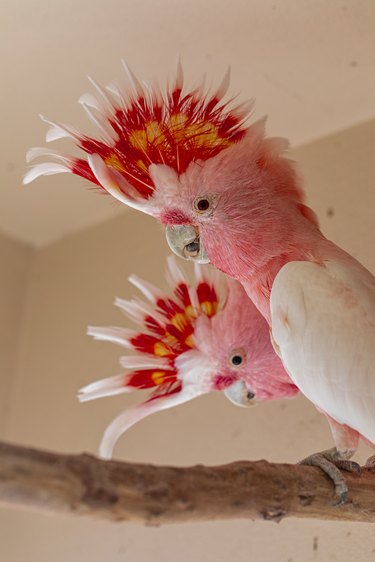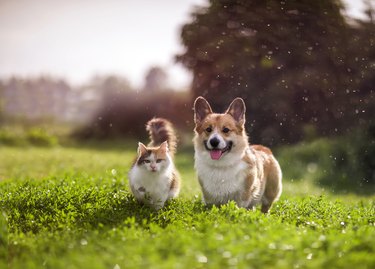Human relationships with animals have experienced great changes since our hominid ancestors first used fire to keep predators at bay. Once aggressors and then helpers, animals have only recently enjoyed the companion role we bestow on pets. As pets become more emotionally intertwined with human life, the issue of their life span, which is considerably shorter than ours in most cases, has become a more troubling issue.

Video of the Day
Varying life spans
Every species as well as subspecies has its own expected life span. Members of the human species, the longest-lived primate species, can expect to live to 78.7 years old.
Video of the Day
Some species of turtles and tortoises can live more than 50 years and can even exceed 100 years of age. Cockatoos and some parrots exceed the half-century mark. However, your four-footed pet is likely to pass on before the age of 20.
Brain size in relation to body size provides one possible answer. Animals with larger brains relative to their body size live longer, reach sexual maturity slower, and reproduce in smaller numbers.
Why large brains matter
Capuchin monkeys are a good example of the role of brain size. These primates weigh just 6 to 10 pounds yet possess the largest relative brain size of any monkey and have a life span that exceeds 50 years. By contrast, a similarly sized golden monkey weighs 8 to 15 pounds and lives just 19 years at most.
A 2021 study published in the Proceedings of the National Academy of Sciences of the United States of America detected selection in genes associated with metabolism, muscular wasting, and kidney function that suggested adaptation to periodic resource scarcity. When compared to other mammals, the study revealed evidence of selection in multiple genes associated with longevity and brain development.

Big dogs age faster
Both dogs and cats have an average life span of 15 to 16 years. You might think that larger dogs with their larger brain would have the edge on longevity in the dog world; however, smaller breeds tend to have a larger brain-to-body ratio and typically outlive larger breeds. Whether a dog is mixed breed or purebred doesn't affect longevity as much as body size.
Domestic dogs, with their wide spectrum of subspecies, provide an interesting area of study, as it's recognized that larger dogs live shorter lives than their smaller counterparts. Small dogs tend to live close to 15 years, medium dogs live around 14 years, and large dogs live just over 13 years on average. Breeds in each size category can also vary. For example, Great Danes live 9.6 years on average, but similarly sized Great Pyrenees dogs live about two years longer.
Dogs who grow at an accelerated rate, such as large breeds, might be more prone to accelerated abnormal cell growth such as is seen in cancer. Large breeds die of cancer more often than small breeds. A healthy diet and healthy weight for your dog's breed are the most important factors in helping your pet live as long as possible.
Lifestyle affects a cat's life span
Cat breeds are typically similar in size and brain-to-body ratio. Mixed-breed cats tend to be the longest-lived due to genetic diversity. However, average pure-breed longevity can vary by a few years. Birman cats live an average of 16 years, while Siamese, Persian, and Burmese breeds tend to live 14 years. On the shorter end of the scale, Abyssinians and ragdolls live an average of 10 years, while Maine coons and British shorthairs live 11 to 12 years.
Cat life span can vary greatly due to whether they are indoor or outdoor cats. Outdoor cats have greater exposure to viruses, toxic substances, and the potential for trauma than those kept indoors. Outdoor cats typically live less than five years.

Some pets last a lifetime
Although dogs, cats, and other typical pets tend to be outlived by their humans by many years, the animal kingdom offers plenty of organisms with widely varying life spans. You might keep some of these as pets for a lifetime.
Several species of tortoises and turtles live more than half a century. The Eastern box turtle, for instance, can live 138 years, so you'll want to make arrangements for your shelled buddy for after you've passed on. Parrots can live for up to 50 years and pink cockatoos for about 83 years. A mute swan or two in your backyard pond can delight you for years on end — 40 years or more, to be precise. You might as well stock that pond with some common carp too since the fish can keep your swans company for an average of 37 years.

Speaking of aquatic animals, the ocean quahog, a clam-like bivalve, commonly lives more than 100 years and can live up to 500 years. A red sea urchin or rough-eyed rockfish could each be around for about 200 years. Do you have an aquarium big enough for a 4-meter-long fish? The Greenland shark isn't even considered mature until it reaches 156 years old and can live its slow-motion life for 272 to 500 years.
- Centers for Disease Control and Prevention: Life Expectancy
- Proceedings of the National Academy of Sciences of the United States of America: The Genomics of Ecological Flexibility, Large Brains, and Long Lives in Capuchin Monkeys Revealed with FecalFACS
- American Kennel Club: Why Do Small Dogs Live Longer Than Large Dogs?
- The University of Alabama at Birmingham: Undefined Longevity
- PBS Specialist Pet Travel: Parrot Lifespans: How Long Do Parrots Live For?
- New England Primate Conservancy: Golden Monkey
- AnAge: The Animal Ageing and Longevity Database
- Veterinarians.org: How Long Do Cats Live? The Average Cat Lifespan